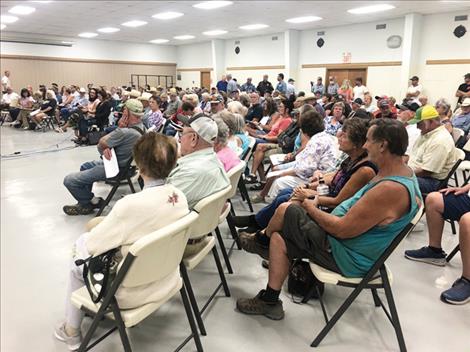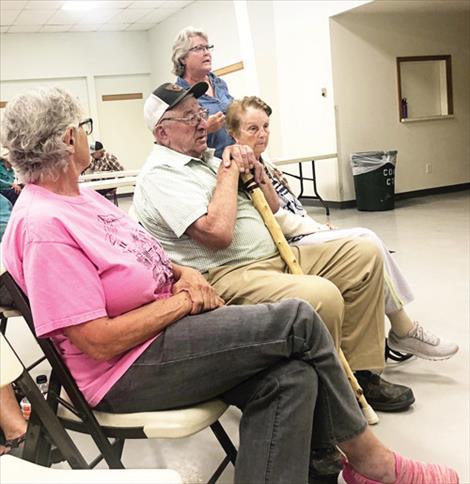Commissioners amend controversial resolution
Hey savvy news reader! Thanks for choosing local.
You are now reading
1 of 3 free articles.
RONAN — Just a week after meeting with around 250 disgruntled irrigators Aug. 30 at the Ronan Community Center, Lake County Commissioners convened last Wednesday to reconsider a controversial resolution that would have removed the county from the chore of collecting irrigation fees.
The resolution, approved by two of the three commissioners on July 20, enumerates reasons the commissioners believe the county treasurer should not be responsible for billing, collecting and distributing operation and maintenance fees for the Flathead Indian Irrigation Project.
The move, which would have wreaked havoc with fee collection for next year’s irrigation season and conceivably led to a shutdown of the irrigation project, was the topic of the Aug. 30 meeting, requested by irrigators. Following the nearly three-hour confab, commissioner Gale Decker met informally two days later with four irrigation district commissioners. Their conversation led to last Tuesday’s hearing.
The process of assessing and collecting irrigation fees is convoluted at best, especially on a vast irrigation project that encompasses four counties and the Flathead Reservation, and is managed by the Bureau of Indian Affairs. Complicating matters further, Lake County is home to three irrigation districts: Flathead, Mission and Jocko, each with their own elected commissioners and office staff.
According to Decker, the process goes this way: the Flathead Indian Irrigation Project’s general manager, who works for the BIA, sets Operation and Maintenance fees, which are then approved by the districts, who also set administration fees. The BIA sends a statement to the county treasurers that lists all the irrigators, the number of irrigated acres and the O&M assessment. The districts would typically inform the treasurer of the administrative assessment, and the combined amount would appear on irrigators’ tax statements.
This year, however, the administrative fee of $2 approved by the districts didn’t find its way to the treasurer in time for her to include it in the tax bill that goes out in mid-October. And that’s just this year’s issue.
According to Decker, records the county receives from irrigation districts have been rife with inaccuracies since 2018.
Under state statute, he says the Department of Revenue’s local office is supposed to add the irrigation fee assessments to the property tax statements. But the office declined to continue adding fee assessments about four years ago, so the county treasurer picked up those duties.
Initially, says Decker, it wasn’t a big job, “until all the errors in the irrigation district records started surfacing. Those errors and the amount of time responding to irrigator questions led us to where we are today.”
Commissioners say they had tried to resolve bookkeeping issues with irrigation districts prior to passing the resolution, but to no avail. That ongoing frustration, and language in the recently passed water compact settlement, led them to try to extricate the county from the process altogether.
Cassie Dellwo, attorney for the Flathead Irrigation District, sees matters differently.
“You’re not helping anybody by taking a stance of ‘we’re not going to do it’ instead of finding a resolution,” she told commissioners at the public meeting in Ronan.
At last Wednesday’s meeting, both sides appeared to be committed to finding a route through the overlapping disputes.
After taking public comment, the commissioners unanimously voted to change the resolution’s effective date from 2022 to 2023, giving them an additional year to sort matters out with the irrigation districts and, hopefully, the state.
In the interim, the commissioners plan to write a letter, ideally with support from the irrigation district commissioners, that seeks an opinion from the state attorney general on who is responsible for billing, collecting and dispersing fees for the districts and the BIA.
“Whatever the attorney general decides would drive the bus going forward,” said commissioner Steve Stanley.
“I’d love to have guidance from someone further up the food chain,” said Ray Swenson, chairman of the combined Mission Jocko Irrigation Districts. “I don’t see any hiccups coming from the Mission-Jocko side, but we do need a public meeting” before signing on to a letter.
Crafting a Memorandum of Understanding that would define and hopefully address other areas of frustration is also on the table.
“The value in an MOU is that irrigators and commissioners can agree on a certain set of facts, identify big issues, set some time frames, and keep discussions moving forward,” said Decker.
In addition to bookkeeping irregularities, another thorny issue is property owners who are assessed irrigation fees, but don’t receive water. Although the BIA has a process in place to remove lands from the project that aren’t irrigable, it’s long and cumbersome.
Larry Nelson, general manager of the FIIP, outlined the steps at last week’s meeting. Landowners who want their lands re-designated as non-irrigable first fill out a form available from the local BIA office; that in turn wends its way to the engineer and director for the BIA Northwest Region before heading to the desks of the Assistant Secretary and Secretary of the Interior.
Although Nelson said the time frames vary, “in the four years I’ve been here I’ve had a couple of requests in the process that are still pending.”
Because the assessments land on their tax bills, frustrated property owners call the county. “We’ve had numerous people come into our office over the years and say ‘I don’t get a drop of irrigation water, and yet year after year I pay fees.’ Is that legal and should the county be a party to this?” Decker asked in defending the county’s attempt to remove itself from fee collection.
Some participants at last week’s hearing urged commissioners to rescind the resolution instead of amending it. “It’s not in the taxpayers’ or irrigators’ interest to work with the county if they’re going to hold a piece of paper over our heads,” said one audience member in urging the commissioners to abolish the resolution.
But commissioner Bill Barron countered that he hopes amending the resolution to take effect in 2023 “puts more urgency and pressure on the attorney general to respond to this quickly.”
He added that “in a perfect world” the Department of Revenue would resume its duty to gather assessments from the irrigation districts and BIA and deliver it to the county treasurer in a timely fashion. “If getting there means holding the state accountable, that’s something we can work together on,” he said.
Stanley also supports reengaging the Department of Revenue in the process, continuing to work with irrigators in resolving additional issues, and advocating for legislative action, if necessary.
After the large public meeting, “I realized we’re dealing with neighbors, and the one thing we forgot when we’re dealing with neighbors is that we quit communicating,” he said. “We need to start communicating and work these problems out long before we get to where we are today.”

















